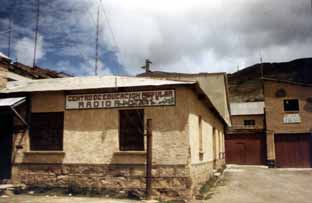|

Radio Pio XII, Llallagua, Bolivia.
(Photo by Hermod Pedersen, 1988)
January 1997
New
threats against Radio Pio XII
From
DEVMEDIA list, January 1997, and translated from Spanish
by Don Moore
"We
return to the situation that Radio Pio XII and its Director
Padre Roberto Durette are in.
"After the events of the end of the year in the mines of
Amayapampa and Capasirca that concluded in a massacre in
which ten persons lost their lifes, the threats against
Pio XII and Padre Roberto have continued.
"'We have received direct and indirect threats and accusations
of being responsible for the conflict' said Durette, adding
that as director he is considered responsible for the deeds,
because from the beginning (he? the station?) covered everything
that occured between the police, the army, the peasants,
and the miners in the north of Potosi.
"Durette assured that when he had the opportunity
to enter the military base of the zone, he saw on a blackboard
messages such as "call to subversion - Radio Pio XII" and
"alert to the population - Radio Pio XII" and he saw a drawing
which illustrated how they (the army) was going to intervene.
"Roberto pointed out that "now that the threats continue,
there are no guarantees that Pio XII's transmissions will
(be permitted?) to continue. I remember the situation in
which Llallagua, Amayapampa and Capasirca lived where hundreds
of police and soldiers violenty retook those mining centers,
wounding and killing.
"In the second day of the conflict (Dec 20), we wanted
to cover the news, so that the entire country would know
what was happening. The radio station's vehicle was intercepted
by the police and was used to transport soldiers. The vehicle
was later returned. According to the Oblate priest (Durette),
the Pio XII and other reporters had their taperecorders
and other materials confiscated. The recorded cassettes
were confiscated by the police and the reporters were threatened.
"For this, we ask you to send notes of solidarity
with the station and its director, asking guarantees that
it continue its work, to:
Lic. Gonzalo Sanchez de Lozada
Presidente Constitucional de la Republica de Bolivia
Palacio de Gobierno
Fax: 591 2 391262
and
Lic.
Mauricio Balcazar
Ministro de Comunicacion
Ministerio de Comunicacion
Fax: 591 2 371314
Please
send a copy of all notes to Pio XII as well."
Tue, 18 Oct 1994
Censured
after fight
against toxic waste
The Bolivian
highlands station "Radio Pio XII" has come under attack for
speaking out against toxic mineral waste dumping in the mining
villages of Patacamaya and Siglo XX, reports the October issue
of "La Lettre", the monthly journal of Reporters sans frontieres
(RSF). The conflict over toxic waste came to a head when residents
of Patacamaya and nearby Siglo XX blocked traffic on the Panamericana
highway in August in protest of the open dump sites near their
homes. "Radio Pio XII" and other members of the Bolivian media
spoke out against the latest accord to treat foreign mineral
waste. With the drop in mineral prices on the export market,
Bolivia has turned to mineral waste treatment. The government
is pinning hopes on its recent contract with Germany to keep
the mining industry alive and to prevent mine workers from
turning to coca farming.
The
August protest, which was countered by the government, left
one demonstrator dead. Since then, "Radio Pio XII" has faced
abuse and harassment by officials in a barrage of letters,
phone calls and denunciations in the media. The Ministry
of Mines accused the station of "hating mining, foreign
investment and modern technology," and of disseminating
false and incomplete information which it perceived as being
anti-government and purposely in the interest of the mining
workers movement, unhappy with a 1993 agreement to restructure
the public mining sector. Authorities also accused "Radio
Pio XII" of fomenting "subversive activity." "Radio Pio
XII" has enlisted the assistance of the International Radio
Broadcasting Association of Bolivia (AIR) to appeal on its
behalf to the President of Bolivia.
On
a positive note, RSF also reports that the five Bolivian
journalists who were brutalized by police while covering
the workers' demonstration have succeeded in pressing charges.
The above
is from the IFEX Communique of October 17, 1994.
The IFEX Communique is published weekly by the IFEX Clearing
House, Toronto. The facility is operated by the Canadian Committee
to Protect Journalists in partnership with the member organizations
of the International Freedom of Expression eXchange (IFEX).
|